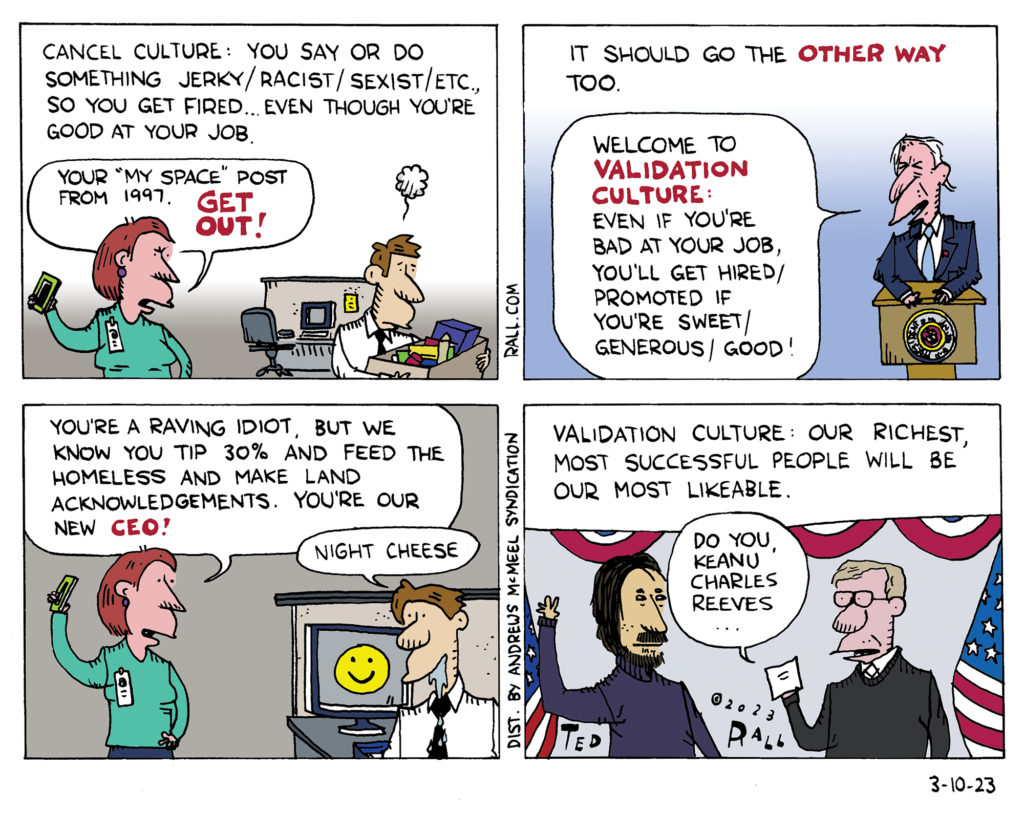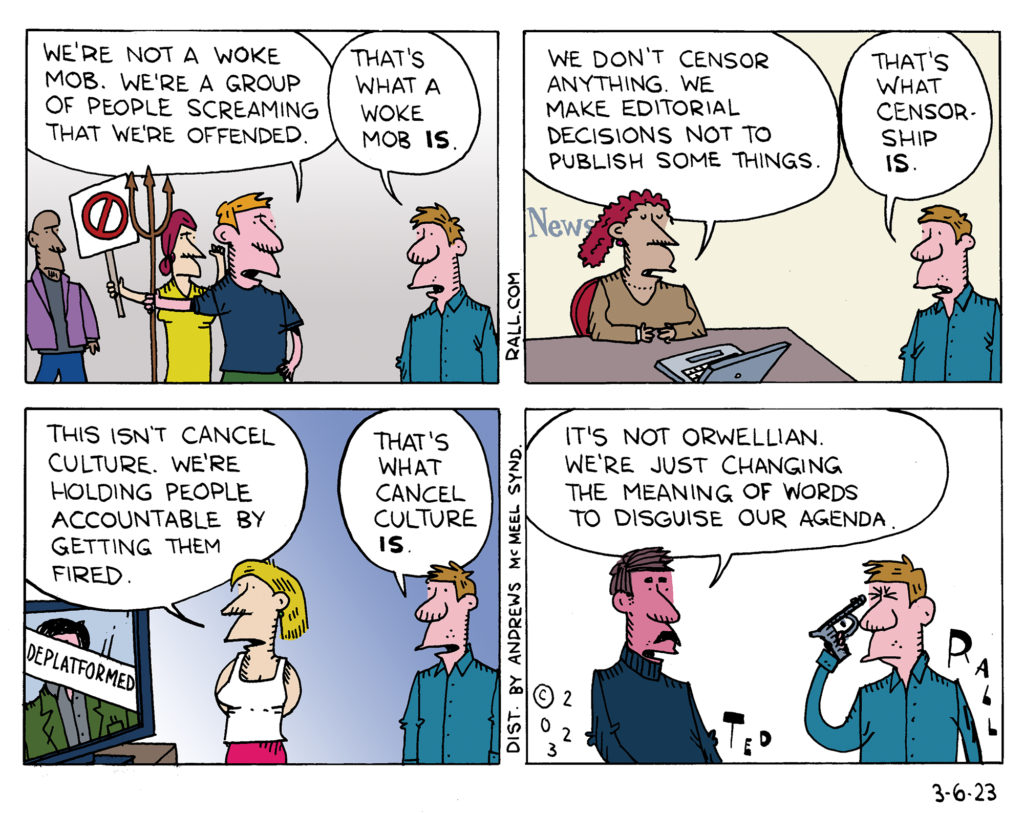In cancel culture, people who do something offensive find themselves out of work. Shouldn’t it work the other way around too? Why not reward incompetent people with great jobs if it turns out that they are nice outside of work? Or are we just a bunch of negative people?
That’s What Cancel Culture Is
Controversy that followed race-baiting by cartoonist Scott Adams that led to the cancellation of the iconic comic strip “Dilbert” included numerous people denying the meaning of words and terms involved. Those who were angry and wanted action against him. But they didn’t want to be seen as taking action.
What To Do About Kanye West

How to respond to Kanye West? His business partners severed ties. Liberal media outlets resorted to cancel culture. Elon Musk gave the artist now known as Ye a second chance on Twitter, only to regret his magnanimity after Ye posted a graphic of a swastika intertwined with a star of David, and kicked him back off the platform.
The freak show that kicked off with Ye’s 2018 Oval Office meeting with President Donald Trump—a moment whose strangeness was reminiscent of Nixon Meets Elvis—culminated over the last two months with, among other acts, Ye’s bizarre donning of a White Lives Matter shirt, anti-Semitic threats on Twitter, hanging out with a white nationalist and praising Hitler and the Nazis during a video appearance with Alex Jones.
I’m not a psychologist but you don’t have to be a mental health expert to see that Ye is suffering from some sort of personality disorder or illness that is causing or contributing to this former billionaire’s public decompensation. We know that he suffered from depression after the 2007 death of his mother and has been formally diagnosed with bipolar disorder, which causes extreme mood swings. When someone is in the throes of a psychological crisis, responding politically subjects someone who ought to get help to punishment instead—punishment that can only exacerbate their pain.
Trevor Noah suggested that Ye needs to be “counseled, not canceled.” But how?
As a leftist I’m hardly predisposed to sympathizing with a billionaire who expresses loathsome racist and bigoted political views. Nor do I often agree with the point of view of corporations like Adidas, Balenciaga, Gap and Creative Artists Agency (CAA), all of which cut ties with the troubled rapper. But these companies can hardly be faulted for trying to protect their brands.
Yet I have even less sympathy for liberals and progressives who take to their opinion columns to pompously approve of the dismantling of this man’s life and career. Where is their compassion? “If the culture averted its gaze from his indiscriminate bluster, what would be the loss?” Robin Givham asked in The Washington Post. To me personally, nothing at all. I don’t listen to Ye’s music. That’s not the point.
Because he is a human being in crisis, Ye deserves sympathy. Because celebrities and the way we treat them trickles down, his pitiful situation matters to the rest of us.
Society suffers when we don’t live up to liberals’ oft-stated declarations that we should sympathize with people who struggle because the organ that is broken happens to be their brain as opposed to, say, their lungs or their liver. If you saw a woman fall and break her leg, you would stop and help her. Watch the same woman curse at someone who isn’t there, and you avert your eyes and hasten by.
Yet judging that woman is self-destructive: any of us might lose our mind. All it takes is a shift in the chemical balance between your levels of dopamine and serotonin.
Criminal courts and common people rightly consider mental state and motivation when assessing guilt or innocence, and, if guilt is found, severity of punishment. The tricky question is: is Ye anti-Semitic, crazy or both?
After a drunken Mel Gibson went on an anti-Semitic rant after being pulled over by a police officer, he explained that he had “said things that I do not believe to be true and which are despicable.” But thoughts and opinions don’t come out of a vacuum. He didn’t speak Aramaic or reference string theory; he doesn’t know those. Gibson obviously has some dark thoughts about Jews rattling around in his brain. In vino veritas? Perhaps. We don’t know what he says in private when he’s sober. Fortunately for him and for filmgoers, Gibson seems to have managed to keep it together since then.
It’s also possible that Gibson stifles hate speech when he’s not residing at the bottom of a bottle and that Ye knows better than to indulge his inner self-hating white nationalist when he’s not in thrall to a manic episode or depression triggered by a messy public divorce. Intriguingly, were he feeling sane, Ye might not even believe that garbage, much less express it. Some studies have established a link between extreme racism and bipolar disorder, schizophrenia, and other psychotic disorders.
Arguing in New York magazine that sanctions against Ye are appropriate if for no other reason than they serve as deterrents, Eric Levitz writes that “I don’t think we can actually know that West’s bigotry has nothing to do with his illness.” Just so. We don’t know. We can’t know. And that should be the determining factor. One of the core principles of Western culture is that the burden of proof rests with the accuser. If you don’t know for sure, you can’t convict.
Also, if deterrence worked on crazy people, Ye would have altered his behavior the first time he lost a business deal.
It is worth remembering that the Americans with Disabilities Act protects workers suffering from mental illness from getting fired. Ye wasn’t an employee of the companies that stopped working with him, so the law doesn’t apply. Nevertheless, corporate America should voluntarily stand for the principle that psychological problems should not be cause for terminating a contract. Businesses that are understandably shocked and disgusted by Ye’s crazy antisemitism—anti-Semitic craziness?—might instead have issued statements that deplored the sentiments, expressed concern for Ye’s mental well-being, and paused rather than severed their relationships until he seeks and receives the help that he needs.
Hate speech like antisemitism is inherently insane. When the person speaking is off-kilter, a purely political response misses the point even if that hatred has a political tint.
(Ted Rall (Twitter: @tedrall), the political cartoonist, columnist and graphic novelist, co-hosts the left-vs-right DMZ America podcast with fellow cartoonist Scott Stantis. You can support Ted’s hard-hitting political cartoons and columns and see his work first by sponsoring his work on Patreon.)
I Am a Victim of Republican Cancel Culture

The debate over “cancel culture” centers around how Democratic Party, “woke” activists and politically-correct “social justice warriors” expel people from social acceptability or force them into joblessness because something they said or did provoked an online mob.
But Republicans have been canceling people for much longer.
I am living proof.
My career grew to national prominence during the 1990s. By the time Bill Clinton left office, my cartoons and columns regularly appeared in well over 100 American newspapers and such magazines as Time, Fortune and Bloomberg. My editor at the New York Times added up the paychecks and calculated that his newspaper had published more cartoons by yours truly than by any other artist throughout the decade. I had a talk show on KFI radio, a 50,000-watt megastation in Los Angeles. I won major journalism awards, including two RFKs and a Pulitzer finalistship.
Because my cartoons and columns criticized Bill Clinton and the Democrats, the right-wing censorship squads let me be. They didn’t notice that I attacked Democrats from the left. My editor at the Pittsburgh Tribune-Review, a notorious right-wing rag owned by conservative billionaire Richard Mellon Scaife, loved my stuff even though I raged against NAFTA. “You sure know how to stick it to Bill and Hillary!” he beamed. Mm-hm.
I didn’t change my politics or my style after Bush became president. After 9/11, however, I went after Republicans because they were in power. So right-wing cancel culture goons targeted me for elimination.
My website contained a list of newspapers that ran my cartoons. GOP chatrooms and so-called “warbloggers” reproduced my client list, urging Republicans from around the country to pose as angry local subscribers. Fake subscribers demanded that my work be canceled via cut-and-paste complaint email forms the bloggers and their bots helpfully provided. I took my client list offline after my cartoon syndicate figured out their scheme. But many naïve editors kowtowed to the fake readers and canceled me.
Corporate cancel culture was relatively cold, ruthless and willing to overlook the profit motive in order to promote right-wing propaganda. Radio insiders said that high ratings guaranteed your freedom of expression. Despite my strong ratings, however, I was fired after KFI got acquired by Clear Channel Communications, the right-wing home of Rush Limbaugh. “They don’t want lefties on the air,” my program manager explained. “They’re willing to lose money. Anything to censor liberals.” My replacement was unpopular; they didn’t mind.
Even liberal media outlets yielded to cancellation campaigns orchestrated by the extreme Right. Yielding to a chorus of outrage ginned up by Fox News’ Bill O’Reilly and Sean Hannity over a cartoon in which I lampooned the marketing of the war on terror, The New York Times canceled me in 2002. “We thought the subject matter was inappropriate, and do regret that it did run,” a sniveling spokesperson told the Rupert Murdoch-owned New York Post.
The Times’ regular subscribers hadn’t made a peep for a week before Hannity’s army of fools drowned the Grey Lady in cut-and-paste postcards mailed in from flyover country. But Times editors didn’t notice. Nor did they take responsibility for choosing to publish my work. I was memory-holed. The editor who approved my work remained.
In 2004 it was the Washington Post’s turn to throw me to the braying Republican hounds.
Throughout the Bush years my income shrank. No radio station would have me. I was no longer shortlisted for journalism prizes. It became increasingly difficult to get published. I received fewer invitations to speak in public.
You can easily check it out yourself, or you can take my word for it: it’s not like my work got worse. I write better now, I draw better, I speak better than I used to. What changed was that gatekeepers at American media outlets became gun-shy. They would rather publish bland material that doesn’t elicit a response than a strong opinion that generates controversy. Who can blame them? Right-wing cancel warriors, no longer content to get leftie content banned, harass and threaten editors who run it.
No account of a cartoonist’s shrinking client list over the past 20 years would be complete without noting the financial meltdown of print media in general, brutal budget cuts and a widespread practice of laying off the cartoonist first. That goes double for left-leaning commentators who have found themselves out in the cold as the 50-yard line of American politics steadily moved to the right under Republican and Democratic administrations alike.
The same thing happened on TV. ABC canceled Bill Maher; MSNBC fired Phil Donahue, Keith Olbermann and Ed Schultz, all for being too liberal.
Everyone in the media has suffered. But right-wing cancel culture accelerated both of those trends.
I have adjusted to the new media landscape. It’s tough going, but I still have a viable career.
But don’t let anyone think Republican cancel culture isn’t a thing. It is.
And it has won.
Even though there are more socialist voters than either Democrats or Republicans, the Left is out in the cold. 39% of American voters prefer socialism to capitalism. Bernie Sanders’ approval rating is 49%, which is ten points higher than Joe Biden or Kamala Harris. Yet no newspaper in the United States employs a columnist or a cartoonist who endorsed Sanders or admits to being a socialist. Nor does any cable news network employ such a host or frequent contributor. This is not normal or OK. A nation with a vibrant and free news media represents a diversity of opinion. In this respect American news outlets are more rigidly censored than those of authoritarian regimes with state-controlled media.
I oppose left-wing cancel culture. I spoke out against liberal boycotts of companies that advertised on Rush Limbaugh and Dr. Laura Schlesinger. Censorship is toxic whether it comes from the left or the right.
Mostly, though, it comes from the right, and liberals go along with it.
(Ted Rall (Twitter: @tedrall), the political cartoonist, columnist and graphic novelist, is the author of the upcoming graphic novel about a journalist gone bad, “The Stringer.” Now available for pre-order. You can support Ted’s hard-hitting political cartoons and columns and see his work first by sponsoring his work on Patreon.)


